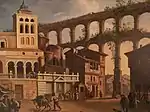José María Avrial
José María Avrial y Flores (26 February 1807 – 28 December 1891) was a Spanish painter, illustrator and scenographer.
.JPG.webp)
Biography
Avrial was born in Madrid. At the age of twelve he was enrolled in classes at the Real Academia de Bellas Artes de San Fernando; becoming a regular student two years later.[1] His professors were Fernando Brambila and José de Madrazo, who entrusted him with creating the lithographs for the Colección litográfica de los cuadros del rey de España.[2]
He was named a "Person of Merit" by the Academy in 1837, a distinction he also received from the Real Academia de Bellas Artes de San Carlos de Valencia the following year for his drawings of the old districts of Madrid.[1] That same year, he was appointed Director of the School of Fine Arts in Segovia, where he established classes in decorative painting and perspective.
In 1839, he presented the San Fernando Academy with a series of drawings depicting the antiquities of Segovia, including the rooms at the Alcázar de Segovia, which would be badly damaged by a fire in 1862.[1] He returned to Madrid in 1840 and devoted himself to painting stage scenery and designing decorations for festivals, employing his expertise with perspective. Much of his work was done at the Teatro de la Cruz where his notable sets included those for Don Juan Tenorio.[3] He was also elected to the "Academia Arqueológica y Geográfica del Príncipe Alfonso".[2]
In 1853, he was named to head the painting section at the Escuela de Bellas Artes de Cádiz,[2] delivering three major speeches on art history in 1854, 1855 and 1856. These were expanded into a book at the request of the school's President. Also in 1856 he won a competition to design a monument for Domingo de Silos Moreno (1770-1853), the former Bishop of Cádiz, but the project was never completed due to lack of funds.
In 1857, he was transferred by Royal Order to the "Escuela Superior de Pintura y Escultura" at the Court in Madrid, where Queen Isabel II named him Secretary of the "Escuela y Junta de Profesores".[1]
In 1865, he was commissioned by the Academia del Príncipe Alfonso to write a report on the archaeological studies of Spain's national architecture, which he also illustrated. Throughout his career, he provided drawings for numerous publications, professional as well as popular.
In 1873, he returned to Madrid, where he became a Professor at the "Escuela Central de Artes y Oficios" of the San Fernando Academy and was also named a member there.[3]
 Engraving of the Alcázar de Segovia
Engraving of the Alcázar de Segovia Vista de la plaza del Azoguejo y Santa Columba, 1850, Museo de Segovia
Vista de la plaza del Azoguejo y Santa Columba, 1850, Museo de Segovia The Museo del Prado, seen from the Botanical Gardens
The Museo del Prado, seen from the Botanical Gardens
References
- Biographical notes from Galería biográfica de artistas españoles del siglo XIX @ the Biblioteca Virtual Andalucía.
- Biographical notes @ the Museo del Prado.
- "José María Avrial, escenógrafo y pintor de Madrid" @ Arte de Madrid.
Further reading
- José María Avrial y Flores: los inicios de la escenografía romántica española, Instituto Nacional de Artes Escénicas y de la Música, Ministerio de Cultura, 2008 ISBN 84-87731-57-0
External links
![]() Media related to José María Avrial at Wikimedia Commons
Media related to José María Avrial at Wikimedia Commons